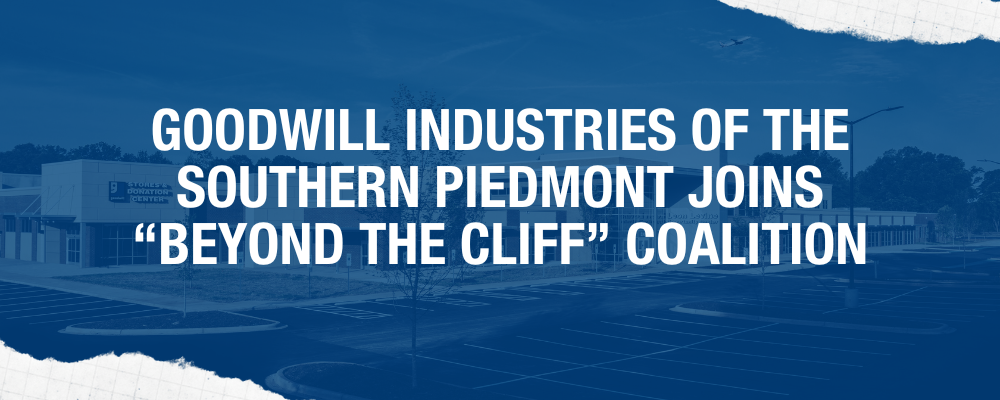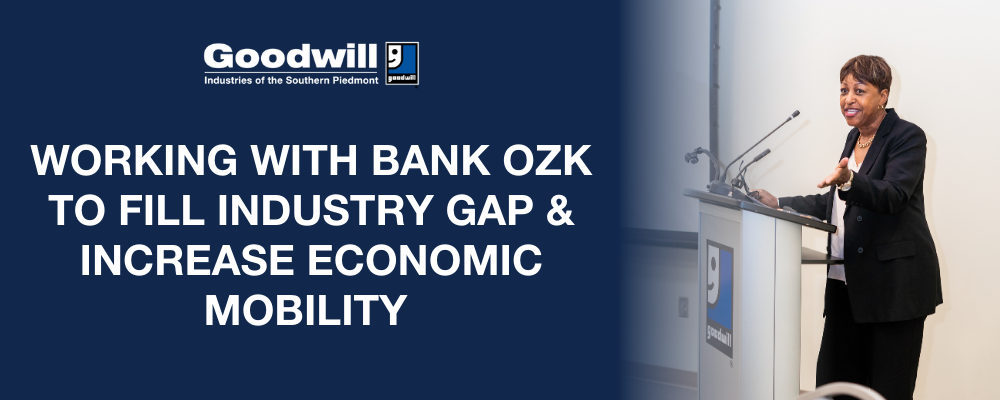Goodwill Industries of the Southern Piedmont (GISP) is announcing its participation in the newly formed “Beyond the Cliff” Coalition. This Coalition is a first-of-its-kind national collaborative of nonprofits, state and local governments, and collaborative stakeholders focused on helping families achieve economic prosperity and specifically eliminating the benefits cliff. The benefits cliff describes the experience that millions of low-income families face when they increase earnings only to face an abrupt loss in public assistance which leaves them worse off financially.
While GISP is a leading workforce development nonprofit and works hard to create access to promising careers for individuals, the organization is aware of the challenges many team members face, and is working to address those obstacles for its team and community through an effort called the Benefits Cliff Community Lab.
GISP already leads a regional coalition of organizations advocating for policies that address benefits cliffs and aid workers in career progression and businesses in hiring and retaining talent. The coalition aims to change the narrative and provide solutions for individuals and families seeking prosperity. They also provide employers with resources on evidence-based practices, programs, and policies designed to mitigate the impact of the benefits cliff and drive upward economic mobility.
“Goodwill is committed to building pathways that help people pursue the life they want to achieve, and that includes our own team members. As we continue to increase wages for our team members, we are committed to finding solutions to address the impact of benefits cliffs and remove as many obstacles as possible so they can prosper and thrive,” said Chris Jackson, President & CEO, Goodwill Industries of the Southern Piedmont.
Recently, GISP, Federal Reserve Bank of Atlanta, Freedom Communities and Atrium Health presented to the Joint Legislative Economic Development and Global Engagement Committee at the North Carolina General Assembly about addressing the benefits cliff. Together they shared about the importance of addressing the benefits cliffs and the positive impact it can have for North Carolina workers and their families – and for businesses. They proposed the committee establish a legislative task force to come up with solutions to the benefits cliff.
Brittany Birken, Community and Economic Development Director and Principal Adviser at the Federal Reserve Bank of Atlanta*, studies the impact of benefit cliffs on individuals and communities and served in an advisory capacity in the formation of this collaborative. She said, “Bringing together these innovative efforts to address the benefits cliff has the potential to identify the solutions needed to increase family economic mobility, meet employers’ talent needs, and ensure that the economy is working for everyone.”
The Coalition is being led by Martha O’Bryan Center with funding support from Kresge Foundation. The inaugural members of the Coalition include:
- Circles Salt Lake and Circles Central Florida, local chapters of Circles USA
- Colorado Benefits Cliff Collaborative comprised of Colorado Department of Human Services (CDHS), CrossPurpose, Innovate+Educate, Spur LLC, and TorchTech,
- Episcopal Community Services of Philadelphia
- Goodwill Industries of the Southern Piedmont
- Hennepin County Office of Workforce Development
- Onondaga County Department of Social Services
- Springfield WORKS
- Tennessee Alliance for Economic Mobility, an initiative of Martha O’Bryan Center in partnership with Tennessee Department of Human Services
- Vermont Department for Children and Families
- Workforce Development Council of Seattle King County, and
- additional partners to be announced at a later date.
In addition, the Federal Reserve Bank of Atlanta and Economic Mobility Pathways (EMPath) will serve in an advisory capacity.
“At Martha O’Bryan, we seek solutions to the root causes of poverty. We are very excited about leading this coalition focused on eliminating the benefits cliff. As an antipoverty organization, we believe families can rise out of poverty in one generation. We recognize that that has not been true in all places for all people. Solving this issue is an important step toward expanding the landscape of opportunity for all families,” Marsha Edwards CEO & President, Martha O Bryan Center.








Join the Conversation